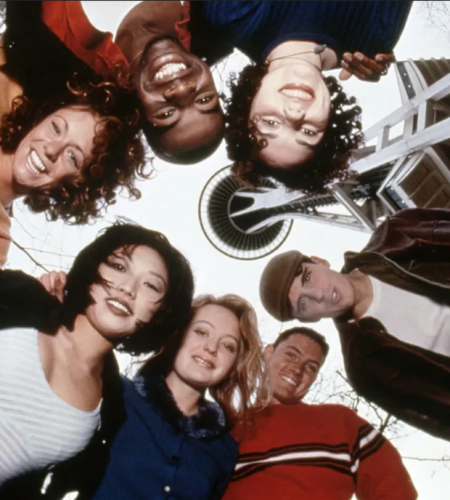Reality TV has come a long way since its inception in the early 1990s. What started as an experimental genre with MTV’s The Real World has evolved into a dominant force in entertainment, influencing a myriad of shows from Love Island to Vanderpump Rules. Early reality TV stars had no idea that the medium would become so influential or bankable. Today, reality stars are acutely aware of their fame and often use it as a springboard to become social media influencers. Let’s take a look at how reality TV has evolved and the lasting impact it has on both viewers and participants.
The Birth of Reality TV: The Real World

source: getty images
The Real World, which premiered on MTV in 1992, is widely considered the grandfather of modern reality television. Programs like An American Family, Real People, and Cops debuted long before MTV had the bright idea to put seven strangers in a house to have their lives tapes, but it’s The Real World that synthesized the modern concept of reality television. The show’s simple premise captured viewers’ imaginations by showcasing raw, unscripted interactions.
In the early ’90s, the casts of the Real World had no idea what to expect. There was no roadmap for becoming a reality TV star, and participants were often chosen for their unique backgrounds and perspectives rather than their potential for drama or marketability. The series focused on real-life issues such as racism, sexuality, and addiction, offering an unfiltered look at young adults navigating the modern world.
Getting While The Getting’s Good
The impact of The Real World can be seen in numerous modern reality TV shows. Even as the genre has evolved, the core elements of personal conflict, romance, and self-discovery remain central themes. Love Island (and all of its international spin-offs) share The Real World’s format of putting strangers together in a confined space, but with the added twist of coupling and romance. While the participants are aware of their potential for fame, the raw interactions and personal drama continue to captivate audiences.
If Love Island takes the approach of shoving a bunch of strangers into a confined space and hitting record, then shows like The Jersey Shore and Vanderpump Rules learned from the Real World’s first big shake up – giving the cast members a job. Vanderpump specifically focuses on the lives of employees (or former employees) at a high-end restaurant. The show blends the personal conflicts and career ambitions that The Real World pioneered. For both Jersey and Vanderpump, the cast’s awareness of their fame adds a layer of meta-reality, as they navigate their lives both on and off-camera.
Early Reality Stars vs. Today’s Influencers
The early stars of reality TV were pioneers of a genre they didn’t fully understand. They participated without knowing the impact that they would have and without the knowledge or expectation of long-term fame. For many, appearing on a reality show was a one-time experience that didn’t necessarily translate into continued media presence or financial success. In contrast, today’s reality TV participants are often very aware of the platform’s potential for launching their careers as influencers. Modern reality stars often enter the show with a clear strategy: gain followers, build a personal brand, and leverage their fame into lucrative endorsements and partnerships.
The Changing Face of Reality TV

source: bravo
As reality TV has evolved, so has its impact on both participants and viewers. The genre has diversified, with shows focusing on everything from survival skills to high society drama. The rise of streaming platforms has also transformed reality TV, making it more accessible and varied than ever before. Platforms like Netflix and Hulu have brought reality TV to a global audience, producing hits like Too Hot to Handle and The Circle. These shows often blend elements of traditional reality TV with new twists and formats, keeping the genre fresh and exciting.
From its humble beginnings with The Real World to the streaming giants of today, reality TV has become an integral part of our cultural landscape. Early reality stars unknowingly paved the way for a genre that now serves as a launchpad for influencers and celebrities. While the motivations and awareness of today’s participants may differ, the core appeal of reality TV—authentic human interaction—remains unchanged.


